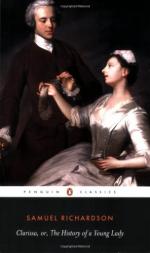It will be seen, by this time, that the author had a great end in view. He had lived to see the scepticism and infidelity openly avowed, and even endeavoured to be propagated from the press; the greatest doctrines of the Gospel brought into question; those of self-denial and mortification blotted out of the catalogue of christian virtues; and a taste even to wantonness for out-door pleasure and luxury, to the general exclusion of domestic as well as public virtue, industriously promoted among all ranks and degrees of people.
In this general depravity, when even the pulpit has lost great part of its weight, and the clergy are considered as a body of interested men, the author thought he should be able to answer it to his own heart, be the success what it would, if he threw in his mite towards introducing a reformation so much wanted: and he imagined, that if in an age given up to diversion and entertainment, if he could steal in, as may be said, and investigate the great doctrines of Christianity under the fashionable guise of an amusement; he should be most likely to serve his purpose, remembering that of the Poet:—
A verse may find
him who a sermon flies,
And turn delight
into a sacrifice.
He was resolved, therefore, to attempt something that never yet had been done. He considered that the tragic poets have as seldom made their heroes true objects of pity, as the comics theirs laudable ones of imitation: and still more rarely have made them in their deaths look forward to a future hope. And thus, when they die, they seem totally to perish. Death, in such instances, must appear terrible. It must be considered as the greatest evil. But why is death set in such shocking lights, when it is the universal lot?
He has, indeed, thought fit to paint the death of the wicked, as terrible as he could paint it. But he has endeavoured to draw that of the good in such an amiable manner, that the very Balaams of the world should not forbear to wish that their latter end might be like that of the heroine.
And after all, what is the poetical justice so much contended for by some, as the generality of writers have managed it, but another sort of dispensation than that with which God, by revelation, teaches us, He has thought fit to exercise mankind; whom placing here only in a state of probation, he hath so intermingled good and evil, as to necessitate us to look forward for a more equal dispensation of both?
The Author of the History (or rather Dramatic Narrative) of Clarissa, is therefore well justified by the christian system, in deferring to extricate suffering virtue to the time in which it will meet with the completion of its reward.
But not absolutely to shelter the conduct observed in it under the sanction of Religion, [an authority, perhaps, not of the greatest weight with some of our modern critics,] it must be observed, that the Author is justified in its catastrophe by the greatest master of reason, and best judge of composition, that ever lived. The learned reader knows we must mean Aristotle; whose sentiments in this matter we shall beg leave to deliver in the words of a very amiable writer of our own country:




